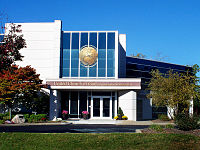United Church of God
| United Church of God, an International Association | |
|---|---|

United Church of God Headquarters Building
|
|
| Classification | Church of God |
| Leader | Victor Kubik |
| Region | International |
| Headquarters | Milford, Ohio |
| Origin | 1995 Indianapolis, Indiana |
| Separated from | Worldwide Church of God |
| Separations | Church of God, an International Community, Church of God, a Worldwide Association. |
| Congregations | 409 |
The United Church of God, an International Association (UCGIA or simply UCG) is a Christian religious denomination based in the United States, an offshoot of the Worldwide Church of God (WCG) founded by Herbert W. Armstrong. It is one of many Sabbatarian Churches of God to split from WCG.
UCG calls itself "The United Church of God, an International Association", with the last three words italicized in order to differentiate UCG from local congregations and denominations which bear similar names. UCG claims no association with any other organization or denomination.
After Herbert Armstrong's death in 1986, the subsequent WCG leadership introduced a series of major doctrinal changes starting in 1994, which substantially altered the fundamental beliefs and goals of the original WCG in the direction of historic Christian orthodoxy. A large segment of the membership wished to retain what they allege to be fundamental or first-century Christian teachings and consequently left WCG to start their own organizations. UCG was established in May 1995 and is the largest of these offshoot organizations.
UCG was founded at a conference organized in Indianapolis, Indiana in the spring of 1995 and attended by WCG and former WCG ministers concerned by the doctrinal changes introduced in the church. UCG's first president was David Hulme, who left UCG after being removed from office for refusing to move the church's home office to Ohio in 1998, among other reasons. He subsequently formed a new group called Church of God, an International Community. Following Hulme, elders selected to serve as president have been Les McCullough in 1998, Roy Holladay in 2002, Clyde Kilough in 2005 and Dennis Luker in 2010. Victor Kubik was elected to a three-year term of office as President in May 2013.
UCG's form of government is different from the one-man, top down leadership established by Armstrong that characterized WCG and its other offshoots. UCG is governed by a 12-man board called the "Council of Elders" that is elected by the church's paid and lay ministers, which form the "General Conference of Elders." The General Conference of Elders meets once a year in May to perform tasks including budget approval, operational planning, strategic planning, electing members of the church council, and participation in seminars. The council acts as the governing body for the international association and is responsible for forming policy and doctrine for the Church. The council meets four times a year.
...
Wikipedia
